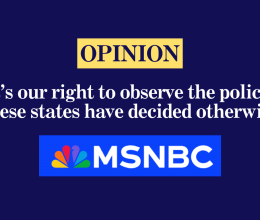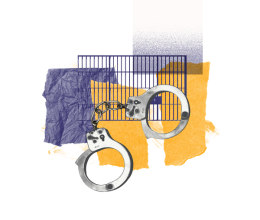Recommendations include reforming or eliminating “habitual offender” statute and giving longest-serving inmates opportunity to earn parole
NEW ORLEANS — The ACLU of Louisiana today released a report outlining a series of reforms to reduce the number of people incarcerated in the state by half by 2025 – saving taxpayers more than $800 million that could be reinvested in making communities stronger and safer.
The recommendations bolster the case for additional reforms, such as reforming the state’s “habitual offender” law, ending mandatory life in prison without the possibility of parole, providing parole consideration for its longest-serving inmates, and advancing racial justice strategies to combat racial disparities in the justice system.
“After spending years as the prison capital of the world, Louisiana’s historic package of criminal justice reforms have helped us shed that shameful title – but more work must be done to combat racial injustice and end mass incarceration,” said Alanah Odoms Hebert, ACLU of Louisiana executive director. “Louisiana’s incarceration rate is still far above the national average, which means that taxpayers are still footing the bill for a bloated prison system that has devastated communities of color and failed to make us safer. This blueprint bolsters the case for a bold, forward-looking reform agenda that will prioritize people, not prisons. In addition to protecting and finishing Louisiana’s criminal justice reform package, legislators should build on it with transformational reforms that will make our communities stronger and safer.”
Among the report’s recommendations and findings:
- Reform or eliminate Louisiana’s so-called “habitual offender” law. Louisiana’s habitual offender laws require longer prison sentences for people with prior convictions. In 2015, nearly 3 out of 4 people admitted to prison under these laws were convicted of a drug or property crime as their primary offense.
- Ending Mandatory Life in Prison Without the Possibility of Parole. Louisiana is one of just six states where adults serving life sentences are never eligible for parole. In 2017, 32 percent of those serving life sentences were younger than 25 when they were convicted, and 21 percent of people imprisoned in Louisiana were age 50 or older.
- Implementing Racial Justice Strategies. As of 2016, the Black imprisonment rate in Louisiana was nearly four times the white imprisonment rate, and 1 in 23 adult Black men in the state is in prison. The report notes that lowering imprisonment rates will not, on its own, combat racial disparities in the justice system. The Blueprint recommends racial justice strategies including: reducing the use of pretrial detention, eliminating wealth-based incarceration, and ending overpolicing in communities of color.
The report is a part of the ACLU’s Smart Justice 50-State Blueprints project, a comprehensive, state-by-state analysis of how states can transform their criminal justice system and cut incarceration in half.
The Louisiana report can be found here: https://50stateblueprint.aclu.org/states/louisiana/
The Smart Justice 50-State Blueprints are the result of a multi-year partnership between the ACLU, its state affiliates, and the Urban Institute to develop actionable policy options for each state that capture the nuance of local laws and sentencing practices.
The blueprint includes an overview of Louisiana’s incarcerated populations, including analysis on who is being sent to jail and prison and the racial disparities that are present, what drives people into the system, how long people spend behind bars, and why people are imprisoned for so long. The Blueprints offer a calculation on the impact of certain reforms by 2025 on racial disparities in the prison population, fiscal costs, and overall prison population and progress towards a 50% decarceration goal.
“Mass incarceration is a nationwide problem, but one that is rooted in the states and must be fixed by the states,” said Udi Ofer, director of the ACLU Campaign for Smart Justice. “We hope that the Smart Justice 50-State Blueprints provide necessary guideposts for activists and policymakers as they pursue local solutions that will address the stark racial disparities in our criminal justice system and dramatically reduce their jail and prison populations. Some of the reforms contained in the blueprints are readily achievable, while others are going to require audacious change. But all are needed to prioritize people over prisons.”
The website and the reports were created by utilizing a forecasting tool developed by the Urban Institute, which can be viewed here: https://apps.urban.org/features/prison-population-forecaster/
The ACLU Campaign for Smart Justice is an unprecedented, multiyear effort to reduce the U.S. jail and prison population by 50 percent and to combat racial disparities in the criminal justice system. We are working in all 50 states for reforms to usher in a new era of justice in America. The ACLU Campaign for Smart Justice is fighting in the legislatures, the courts, and in the streets to end mass incarceration.
For more information about the ACLU’s Campaign for Smart Justice: https://www.aclu.org/issues/smart-justice






